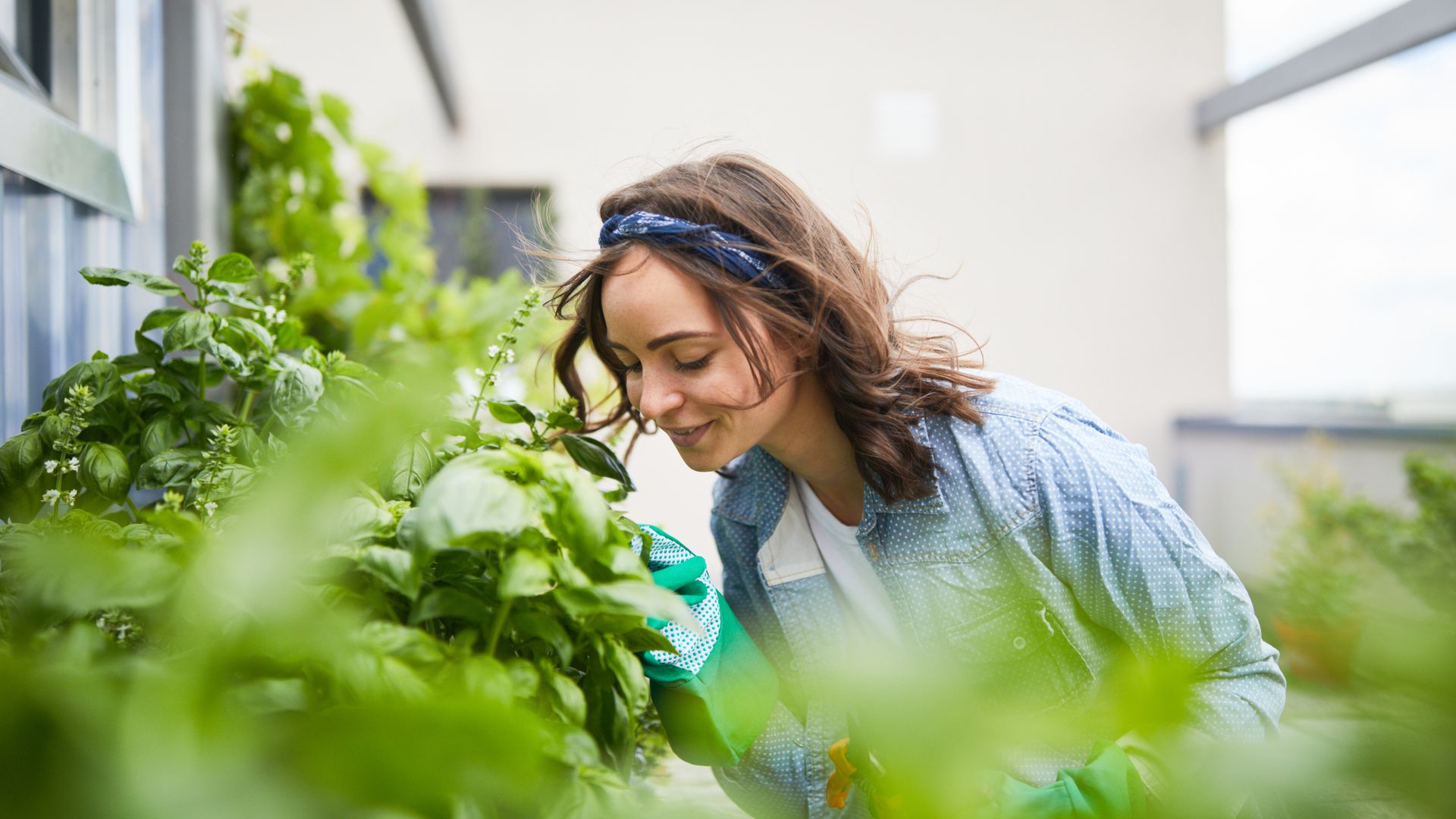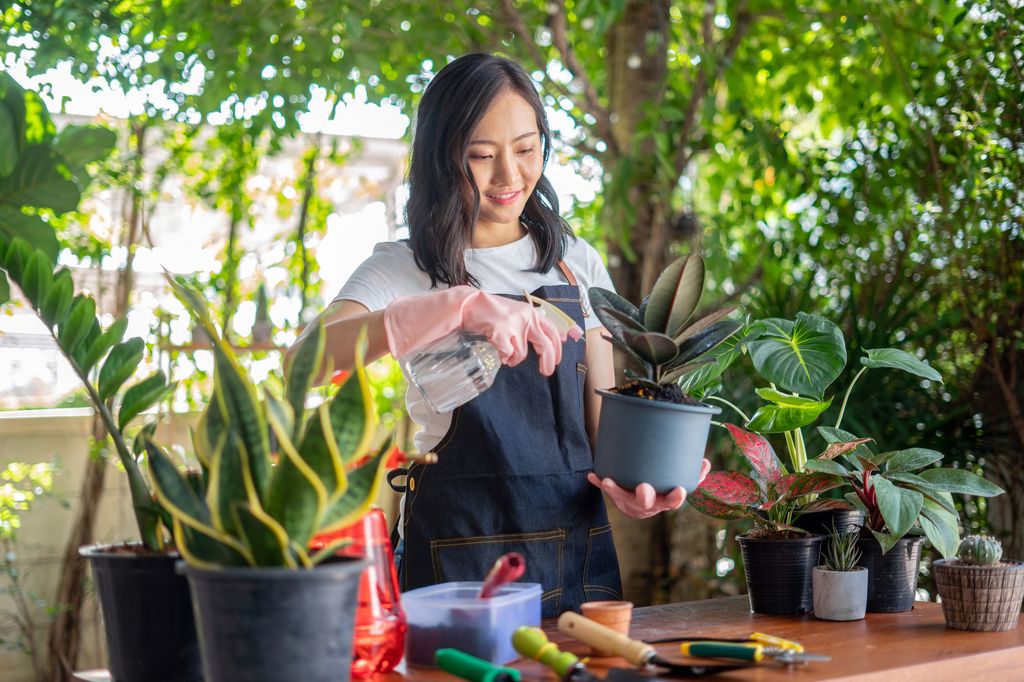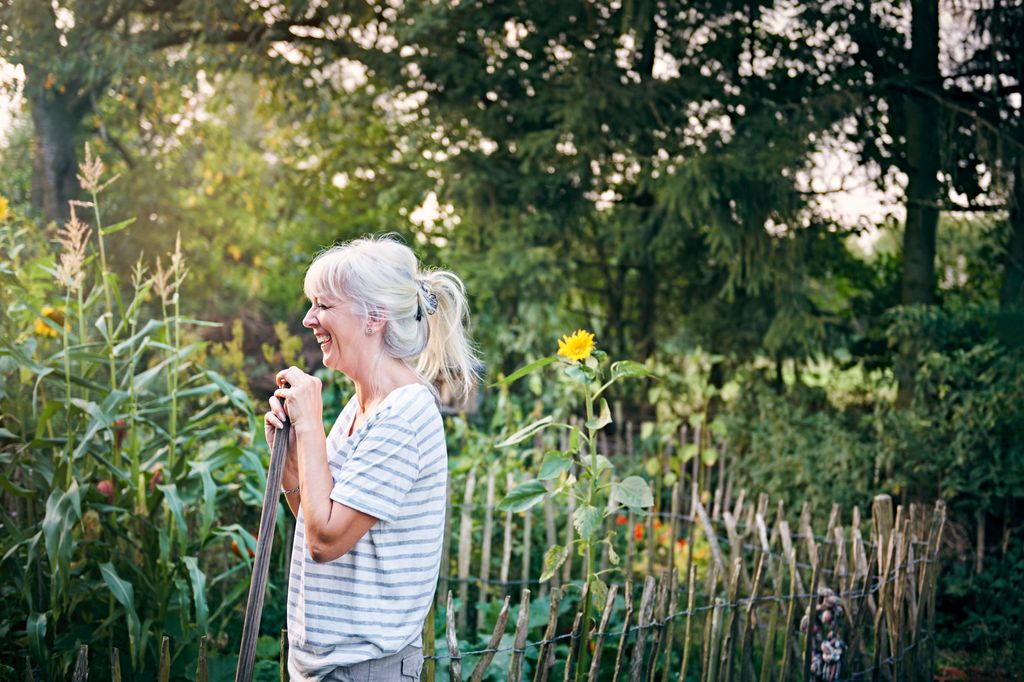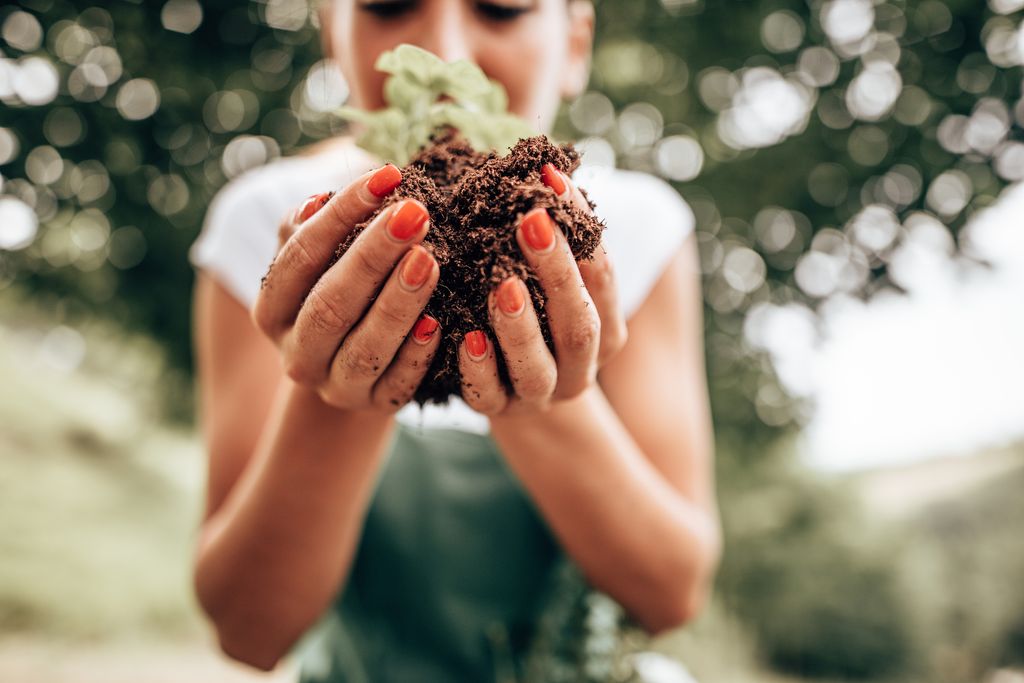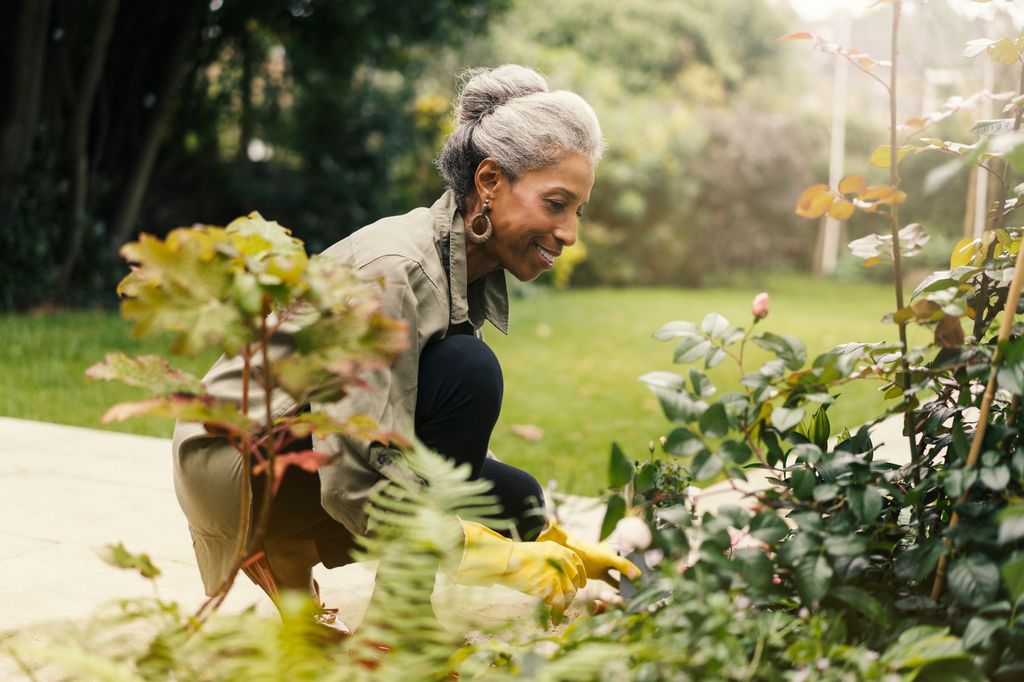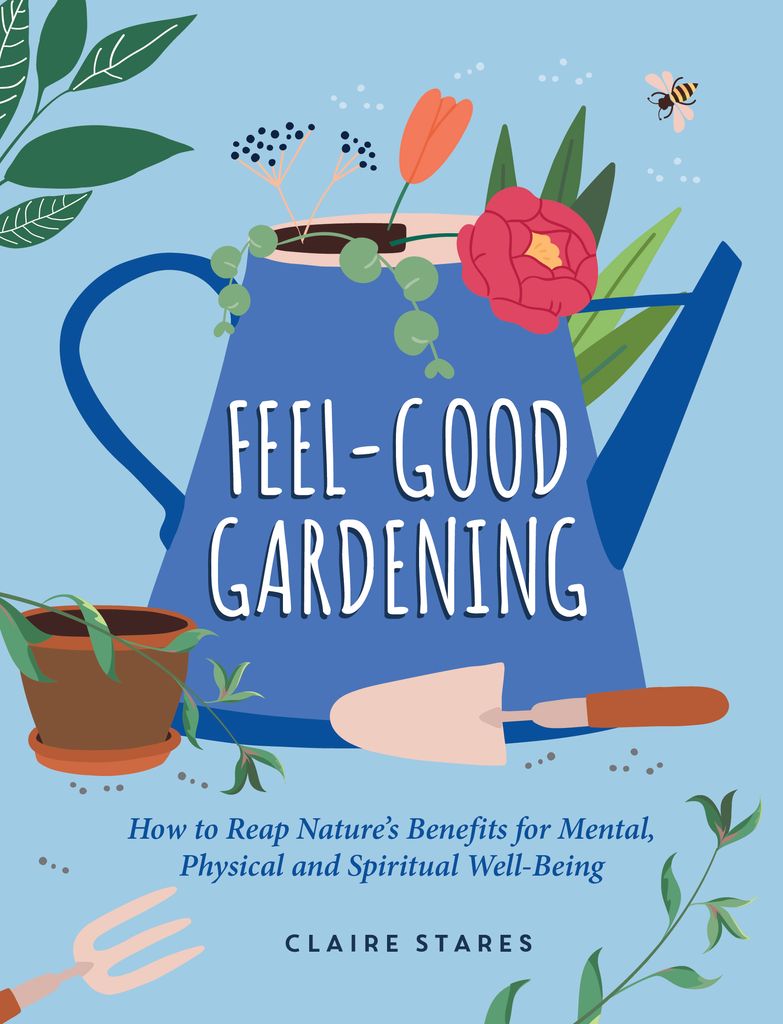If you suffer from anxiety, panic attacks or insomnia, chances are you've tried countless remedies to soothe your nervous system.
But what if we told you, there's an anxiety-easing activity you can do that doesn't cost a penny – and you can do it without leaving your home?
In an exclusive extract from her book Feel Good Gardening, Claire Stares explores the easy ways spending time in our gardens can make us more positive people. The outdoor activity is proven to make us happier, thanks to bacteria found in soil (micobacterium vaccae, if you're interested) which creates a reaction in the body that produces the happy hormone serotonin.
Thanks to this mood-boosting mud, it's no surprise that 59% of Brits believe gardening is an effective way to improve their mental health, according to stats from outdoor apparel brand Columbia.
"Gardening offers many opportunities to engage in activities which can redirect our mental focus away from anxiety-inducing stimuli and negative thoughts," Claire writes. "Rhythmic, repetitive motions have a meditative effect, calming the brain.
MORE NATURE: How tidal swimming helped me make sense of incomprehensible grief
"Tasks like mowing the lawn, raking leaves, digging, seed sowing and weeding can soothe the sympathetic nervous system, which is responsible for triggering the body’s fight-or-flight response and, when overactive, can cause anxiety, panic attacks and insomnia," she said.
Gardening has also been shown to increase alpha waves, the brainwaves associated with rest and relaxation, and reduce beta waves, the brainwaves which mainly occur when we are mentally alert and focused.
Read on for 5 ways your garden can make you happier
1. Choose calming colours
A garden colour scheme based on soothing shades of green, white, blue and lavender is the easiest way to create a calm oasis, bringing balance and inviting inner peace.
A vibrant palette of red, orange, yellow and pink can uplift your mood, encouraging feelings of happiness, energy and optimism. When planning your floral displays, make sure there will be year-round colour.
A garden in winter is characterized by muted neutrals – brown, beige and grey – which can negatively impact our emotions. However, an injection of fiery-stemmed dogwoods, cheery pansies or bold cyclamens will brighten even the darkest of days
2. Consider flower scent
The importance of scent is often underestimated. However, many fragrances have the power to alter our mood to create feelings of tranquillity, alleviate stress, ease insomnia or provide clarity and focus.
When it comes to designing an aromatherapy garden, the first step is to consider location. Use highly perfumed flowers, aromatic herbs and plants with fragrant foliage to surround outdoor seating, dining or meditation areas.
You can also grow them in window boxes, so their fragrance will gently waft inside your home. You can’t go wrong with sweet-scented favourites like roses, sweet peas, lilac, jasmine, honeysuckle, lavender and scented narcissi.
For a heady nighttime scent, grow evening primroses, nightscented stocks, night phlox, nicotiana, moonflower and angel’s trumpets.
3. Practice garden gratitude
The act of expressing gratitude builds emotional awareness and is associated with numerous well-being benefits, including improved motivation, mood and sleep quality. While it’s understandable to feel downhearted if slugs munch their way through your vegetable plot or a favourite houseplant shrivels up and dies, focus on the positives instead with a weekly gardening gratitude journal.
READ: How nature cured my heartbreak after a brutal breakup
Think about your garden and gardening experiences. What are you thankful for? What has made you feel joyful? Who has helped you on your gardening journey? Be as specific as possible and jot down your reflections. The chances are that you’ll soon see your garden in a more favourable light.
4. Speak garden affirmations
Affirmations are powerful and positive statements that aim to support, motivate or challenge you in some way, tapping into both your conscious and unconscious mind. Repeating affirmations during meditation can be a great way to affirm the way you want to live your life, manifest self-confidence, focus on positives and uplift your mood. Pick one of these examples, or better still, create your own.
• My garden is nurturing me and helping me flourish.
• I am at one with nature and nature is at one with me.
• I will grow strong like my plants.
MORE NATURE: Affected by anxiety and stress? You could have nature deficit disorder
5. Be a mindful gardener
Gardening is a naturally meditative pastime but practising mindfulness while you garden can intensify the positive impact it has on both mental and emotional well-being.
Mindfulness is a technique that encourages moment-by-moment awareness of your surroundings, helping you to be fully present, whether you’re sowing, weeding, watering, pruning or harvesting.
As you focus your attention on the task at hand, acknowledge your thoughts, feelings and the physical sensations you’re experiencing. This will help to improve your mental clarity, enhance your objectivity and increase your awareness and acceptance of change, freeing you from negative thoughts.
Follow these tips for more meaningful mindfulness:
• Set aside distractions – Switch off your phone, turn off your music and give the garden your full attention.
• Engage all your senses – Take time to appreciate individual sights, sounds, smells, textures and tastes.
• Attune to nature – Notice the natural rhythms of the sun and moon and the changing seasons.
• Pay attention to the details – Allow yourself to become immersed in your environment. Lie down in the grass and study the insects. Watch spring blossoms dance like confetti on the breeze. Notice a tiny flower blooming in a crack in the concrete. Concentrate on how it feels to plunge your hands into the soil.
• Act with intention – When you’re ready to pick up your tools, set an intention to help you focus and remind yourself why you are carrying out the task – for example, to create a habitat for wildlife, grow food to nourish your body or pick a bunch of flowers to cheer up a friend.
